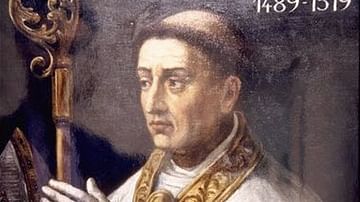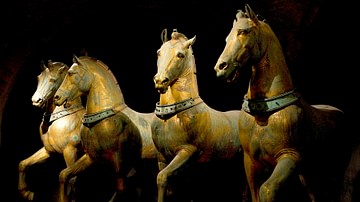Search
Search Results

Article
Reformation & Repression under Bishop Briçonnet of Meaux
As the Protestant Reformation emerged in France in the early 16th century, the city of Meaux became one of the first centers of controversy. Bishop Guillaume Briçonnet II undertook a campaign to reform the Catholic Church from within and...

Definition
Vandals
The Vandals were a Germanic tribe who are first mentioned in Roman history in the Natural History of Pliny the Elder (77 CE). The Roman historian Tacitus also mentions them in his Germania (c. 98 CE), though he also refers to them as the...

Article
The Crusades: Causes & Goals
The Crusades were a series of military campaigns organised by Christian powers in order to retake Jerusalem and the Holy Land back from Muslim control. There would be eight officially sanctioned crusades between 1095 CE and 1270 CE and many...

Article
Dogs & Their Collars in the Age of Enlightenment
In medieval and Renaissance Europe, dogs were considered little more than 'machines' which performed certain tasks, such as guarding a home or tracking game, but this view changed significantly during the Age of Enlightenment (also known...

Article
Byzantine Icons
Icons, that is images of holy persons, were an important part of the Byzantine Christian Church from the 3rd century CE onwards. Venerated in churches, public places, and private homes, they were often believed to have protective properties...

Definition
First Crusade
The First Crusade (1095-1102) was a military campaign by western European forces to recapture the city of Jerusalem and the Holy Land from Muslim control. Conceived by Pope Urban II following an appeal from the Byzantine emperor Alexios I...

Article
The Hippodrome of Constantinople
The Hippodrome of Constantinople was an arena used for chariot racing throughout the Byzantine period. First built during the reign of Roman emperor Septimius Severus in the early 3rd century CE, the structure was made more grandiose by emperor...

Article
Architects of France's 1901 Law of Associations
The Law of Associations was adopted by the French Parliament on 3 July 1901 to limit the influence of Catholic teaching orders as the first step toward the formal separation of church and state that would follow in 1905. Of 16,904 religious...

Definition
Gaiseric
Gaiseric (r. 428-478 CE, also known as Genseric and Geiseric) was the greatest king of the Vandals who remained undefeated from the time he took the throne until his death. He was probably born in 389 CE near Lake Balaton (present-day Hungary...

Definition
Civil Constitution of the Clergy
The Civil Constitution of the Clergy was a law passed in July 1790 during the French Revolution (1789-1799), which caused the immediate subordination of the Catholic Church in France to the French government. An attempt to modernize the Church...